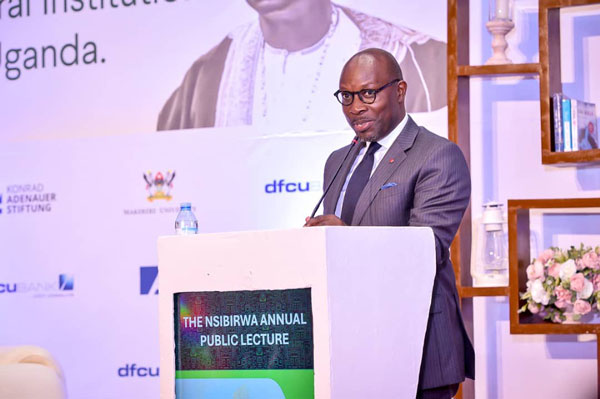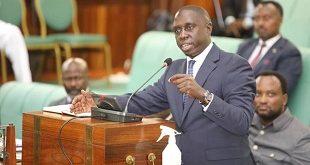
Kampala, Uganda | THE INDEPENDENT | Buganda Kingdom Minister Apollo Nelson Makubuya has reignited the flame of discourse on the need to reclaim and celebrate the continent’s rich cultural legacy.
Makubuya, an ardent advocate for the decolonization of African heritage, questioned the rationale behind naming places after individuals such as Henry Colville, Frederick Lugard, The King’s African Rifles, General De Winton, and Colonel Ternan in cities like Kampala, Entebbe, Jinja, and Fort Portal.
Makubuya was speaking at the second annual Nsibirwa Memorial Lecture held at Makerere University. The lecture series serves as a commemoration of the former Buganda Katikkiro, who played a pivotal role in approving the allocation of land for the expansion of Makerere, a decision that was met with significant protests at the time.
Makubuya commended Makerere University for renaming a residence hall after Nsibirwa, replacing Northcote a name given in honour of Sir Geoffrey Northcote, who served as Chairman of the University Council from July 1945 to 1948. Makubuya questioned the choice to name a hall in an African-leading university after Northcote, emphasizing his negative impact on Africans during colonial times, especially in present-day Kenya.
Makubuya argues that instead of glorifying Uganda’s colonial masters, the university management should consider naming places and buildings after historical figures who embody values such as freedom, dignity, peace, and justice.
He pointed out the university’s distinguished alumni, including former presidents, innovators, and professors, who have made significant positive contributions in various disciplines. Notably, he mentioned Ngugi wa Thiong’o, the renowned Kenyan author, poet, educator and playwright who has pushed for the decolonization of academia.
However, he expressed satisfaction that Makerere University has embarked on a positive journey by naming teaching facilities after figures like former president Yusuf Lule and the first vice-chancellor, Frank Kalimuzo.
He further urged the university to incorporate decolonization into their curricula and programs, emphasizing the need to shift away from Eurocentric education. This call encourages a more inclusive and diverse approach to learning that acknowledges and values perspectives beyond the Eurocentric framework.
Makerere University’s Vice Chancellor Barnabas Nawangwe also lauded Nsibirwa for his visionary leadership, particularly in shaping modern education. He highlighted the significance of two crucial dates: the day when Kabaka Muteesa I wrote a letter to Queen Victoria and the day when Nsibirwa documented the allocation of land to Makerere University. According to Nawangwe, these dates hold critical importance and should be celebrated annually.
Martin Luther Nsibirwa is remembered for his significant role in manoeuvring and persuading the Lukiiko to pass a resolution in 1945 that allowed the colonial government to compulsorily acquire more land for Makerere University. Before that, he had given part of his land in Mulago to the University for the construction of a dormitory for the School of Nursing.
Tragically, after signing the document on September 4, 1945, Nsibirwa was assassinated on September 5 on the steps of Namirembe Cathedral as he went for morning prayers. While the exact motive behind his assassination remains speculative, it is widely believed to be connected to the compulsory acquisition of land. In response, George William Ssenkatuuka, an ex-serviceman in the King’s African Rifles, was arrested, tried, convicted, and sentenced.
In the bid to recognize and honour his extensive contribution to Makerere’s existence, the Northcote Hall was renamed Nsibirwa Hall in 1977 and in 2022, as the University celebrated 100 years, the Annual Nsibirwa Public Lecture. During this year’s lecture, Makubuya delved into the theme of the day, providing context on the role and relevance of cultural institutions in modern Uganda.
Drawing insights from his new book titled “Thrones & Thorns: Reflections on the 30 Years of Restoration of Traditional Rule in Uganda,” he contended that traditional and cultural institutions possess immense potential. He noted that constitutional and political limitations often constrain them. Makubuya also argued that if given the opportunity, these institutions can contribute significantly to society.
Robert Waggwa Nsibirwa, a grandson of Nsibirwa and the second Deputy Katikkiro of Buganda endorsed Makubuya’s perspective on the role of cultural institutions. He cited examples of how the Buganda Kingdom, functioning as a cultural institution in the modern world, has actively sought to transform its people.
The decolonization movement has recently picked up momentum in various African nations. In Uganda, a group led by Makubuya has petitioned the government to establish an independent body tasked with reviewing and renaming monuments, roads, and buildings. The aim is to honour Ugandans and other historical figures who embody values such as freedom, dignity, peace, and justice.
Amid calls for decolonization, former colonial powers are increasingly issuing apologies for past wrongs during the colonization era. During his recent visit to Kenya, King Charles expressed regret for the violence committed by the British before the country gained independence. However, the King fell short of delivering the comprehensive apology that many had called for. Days earlier, German President Frank-Walter Steinmeier offered similar regrets during his visit to Tanzania.
Bwesigye Bwa Mwesigire, in an article published in 2020, contested the notion of the renaming being a triumph for progressive forces advocating for decolonization. He argued that the actual history of the name change from Northcote to Nsibirwa is intricate and does not necessarily align with the ideals that the decolonization of names campaign seeks to promote.
“In one line, the name of that hall was changed as a strategy to break the backbone of student activism at Makerere…Northcote Hall had gained a traditional reputation for being rebellious in behaviour, a behaviour that was enshrined in its belligerent culture…the university disciplinary committee convened a meeting, whose purpose was to assess the situation and make recommendations to the university council. The committee denounced Northcote’s culture of untoward hooliganism and recommended that the Hall be closed and all its students become non-residents,” he wrote.
Nevertheless, Makubuya appears unconcerned about the method used for the renaming and according to him, What matters is the satisfaction of witnessing the hall, where he was a resident during his student days at Makerere, now bearing the name of a visionary leader like Nsibirwa.
***
URN
 The Independent Uganda: You get the Truth we Pay the Price
The Independent Uganda: You get the Truth we Pay the Price


